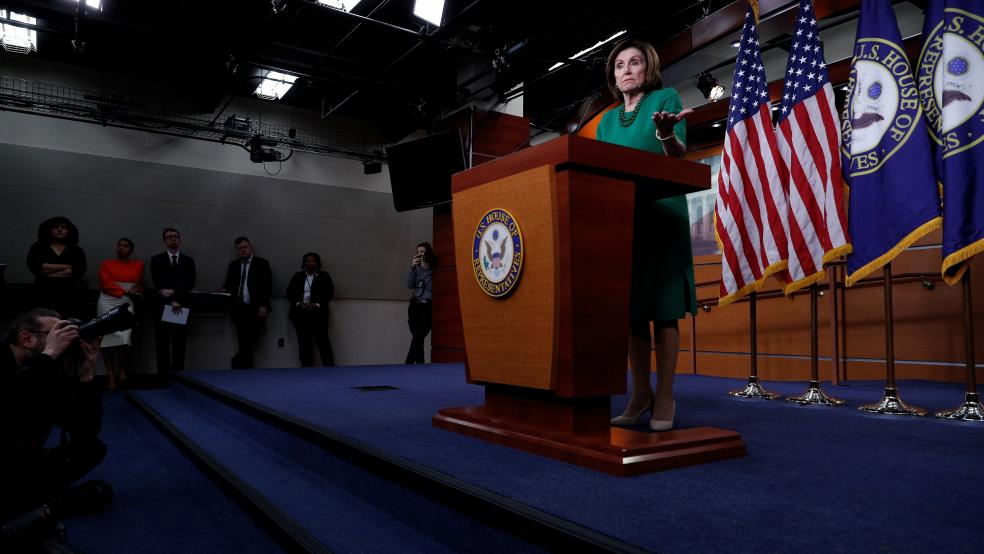President Trump called for unity in his 11-minute Oval Office address to the nation on coronavirus Wednesday night, but that unity was hard to come by on Capitol Hill Thursday as the president and congressional Republicans opposed a response package proposed by House Democrats and negotiations on the legislation continued between House Speaker Nancy Pelosi and Treasury Secretary Steven Mnuchin.
Here’s your news update:
- Pelosi and Mnuchin race to reach a stimulus deal: Pelosi and Mnuchin spoke by phone at least five times Thursday as they sought to finalize a multi-billion-dollar economic relief plan.
- The Senate cancels its recess: Senate Majority Leader Mitch McConnell said the Senate will stay in session next week rather than leaving for a planned recess.
- Biden and Sanders call for a stronger government response: Both Democratic presidential candidates delivered speeches Thursday criticizing the administration’s handling of the pandemic and laying out how they think the government should respond.
- Federal Reserve takes extraordinary action: The Fed said it would pump $1.5 trillion into the short-term lending markets that banks use, a move meant to ensure that financial markets remain stable and liquid. The central bank also said it will change the mix of securities it buys under an existing $60-billion-a-month program.
- Stocks plunge again: The S&P 500 index fell by 9.5%, its worst day since 1987. “Investors are looking for bold government stimulus. So far we haven’t seen a lot of detail and there isn’t much confidence it will happen quick enough,” Nathan Thooft, Manulife Investment Management’s head of global asset allocation, told Bloomberg News.
- March Madness has been canceled: The NCAA called off its men’s and women’s basketball tournaments. And Major League Baseball suspended its spring training games and said it would delay the start of its regular season by at least two weeks.
Trumps’ Speech Fails to Reassure
The administration had to correct or walk back a few policy announcements Trump made, clarifying that trade with Europe will continue and that the 30-day travel restrictions from Europe would not apply to American residents and citizens. Trump had also claimed that private health insurers had agreed to waive co-pays and prevent surprise medical bills for coronavirus treatment, but the insurers’ trade group and the White House later clarified that insurers had agreed to waive co-payments on testing, not treatment.
“From the misstatements to the omissions to his labored demeanor, the president sent a message that shook financial markets, disrupted relations with European allies, confused his many viewers and undermined the most precious commodity of any president, his credibility,” The Washington Post’s Dan Balz wrote.
Can Pelosi and Mnuchin Reach a Deal?
The House speaker told reporters at a morning news conference that Democrats agreed to “most” of the GOP’s proposed changes. “He had some suggestions,” Pelosi said. “All very reasonable. I don’t think that any of them would prevent us from moving forward with the bill.” She rejected a suggestion from House Minority Leader Kevin McCarthy’s that lawmakers delay a planned recess by 24 or 48 hours to keep talks going. "We don't need 48 hours, we need to just make a decision to help families right now," she said.
What Trump proposed: Besides announcing travel restrictions from Europe, Trump proposed financial relief for workers who are ill, quarantined or caring for others and he said would ask Congress to provide $50 billion in funding for the Small Business Administration to provide low-interest loans to businesses disrupted by the pandemic. He also called on Congress to enact a payroll tax cut.
What House Democrats proposed: House Democrats late Wednesday night unveiled their own multi-billion-dollar economic response package, which calls for paid sick leave, free coronavirus testing, additional food aid and expanded unemployment insurance. The legislation would also boost federal funding for state Medicaid costs by 8 percentage points. It does not include Trump’s payroll tax cut or his proposed expansion of loans for small businesses.
You can read a more detailed breakdown of the bill from the Associated Press, and we’ll have more information once the final bill is produced.
Why Trump and Republicans rejected the Dems’ bill: Trump objected to what he called “goodies” in the bill. “There are things in there that have nothing to do with what we’re talking about,” he told reporters. “So, it’s not a way for them to get some of the goodies that they haven’t been able to get for the last 25 years.”
An unnamed administration official told Bloomberg News that those items included an estimated $50 billion increase in federal funding for Medicaid and changes that the White House feared could allow federal money to go to health care providers who perform abortions.
A White House official told Roll Call that the administration supports many of the policies in the House Democrats' bill, but not the ways they are implemented in the legislation.
Congressional Republicans, meanwhile, had their own criticisms of the Democratic package. McConnell panned the House bill Tuesday morning as “an ideological wish list that was not tailored closely to the circumstances." And House Minority Leader Kevin McCarthy of California derided the plan as “completely partisan” and “unworkable.”
The main concern for Republicans was the requirement that employers provide permanent paid sick leave to their workers. “McCarthy and others said there should be an option to exempt some businesses from a paid leave mandate, and that such a measure should include a sunset clause,” Bloomberg reported.
The bottom line: As negotiations continued, both sides reportedly said they were closing in on a deal and a House vote was reportedly still expected Thursday. It’s unclear when that might happen and if it will be on a package that has the support of the White House. The Senate is gone for the weekend, so final passage of any negotiated deal won’t happen until next week.





